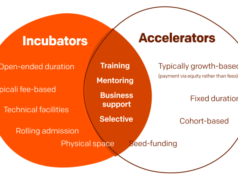The world of science and technology startups has long been dominated by men, but times are changing. Today, more and more women are stepping up to lead innovative startups in fields ranging from biotechnology and AI to renewable energy and robotics. These women founders are not only breaking barriers in male-dominated industries but are also redefining what it means to lead in the world of science and tech.
While progress has been made, women still face unique challenges in the startup ecosystem, especially in sectors like science and technology. However, many are defying the odds and succeeding in creating groundbreaking solutions that have the potential to change the world. In this blog post, we will explore the journeys of women founders in science and tech startups, the challenges they face, and the immense value they bring to the table.
The Rise of Women in Science and Tech Startups

Historically, women have been underrepresented in the fields of science, technology, engineering, and mathematics (STEM), and by extension, in tech startups. According to a 2021 report by McKinsey & Company, women made up just 29% of the global STEM workforce. However, the tide is slowly turning. Over the past decade, women-led startups have grown significantly, and women are making their mark as leaders and innovators in fields that were once considered male-dominated.
Startups like Ginkgo Bioworks, co-founded by Jessica S. Minahan, and Refinery29, led by Christene Barberich, are great examples of how women are not only entering science and tech industries but excelling. These women founders are trailblazers in their respective sectors, creating disruptive companies that leverage cutting-edge technologies to address complex global issues, from healthcare to sustainability.
The Challenges Women Founders Face
Despite the significant strides that women have made in science and tech entrepreneurship, they still face a number of barriers that their male counterparts often do not. These challenges are multifaceted, ranging from access to funding to societal biases, and can make it harder for women to get their startups off the ground.
1. Funding Gaps
One of the most significant challenges faced by women founders in science and tech is access to venture capital (VC) funding. Research has shown that women-led startups receive far less funding than those led by men. In 2020, female founders received only 2.3% of the total venture capital investment in the United States, despite the fact that female-led startups often outperform their male counterparts in terms of profitability.
This disparity in funding is especially pronounced in science and tech, where startups often require large amounts of capital to fund research, development, and scaling. Women founders often find themselves fighting for a smaller share of the pie and must overcome the biases that still exist in the venture capital world, where funding decisions are often influenced by unconscious gender biases.
2. Lack of Representation and Mentorship
Another challenge women face in the science and tech startup world is the lack of representation. Female role models and mentors in leadership positions remain scarce, and the few women who have made it to the top are often expected to serve as examples for others. The absence of these role models can make it harder for young women to envision themselves as leaders in science and technology.
Additionally, women often lack access to the informal networks that can be pivotal in startup success. The “old boys’ club” network, which historically has helped male founders gain access to opportunities, advice, and funding, is still very much in place. Without access to this network, women can feel isolated and disconnected from the resources that could help them grow their businesses.
3. Balancing Work and Personal Life
Women entrepreneurs, especially those in science and tech, often face the challenge of balancing their demanding careers with personal responsibilities, such as family and caregiving. The tech startup world is notorious for its “always-on” culture, where founders are expected to be available 24/7. This can be especially difficult for women, who are often still expected to bear the brunt of household and caregiving responsibilities.
While this challenge is not unique to women in tech, it is compounded by the fact that many women are already juggling multiple roles. As a result, work-life balance can become a source of stress and burnout, making it harder for women to thrive in the startup ecosystem.
The Value of Women in Science and Tech Startups

Despite the challenges, women founders bring an incredible amount of value to science and tech startups. In fact, many women entrepreneurs are uniquely positioned to offer innovative solutions and fresh perspectives that can lead to success in the highly competitive tech world.
1. Diverse Perspectives Lead to Innovation
Diversity in leadership leads to more innovation and better business outcomes. According to a 2020 study by McKinsey, companies with more diverse leadership teams are 25% more likely to have above-average profitability. Women bring different life experiences, leadership styles, and problem-solving approaches to the table, which can result in more creative solutions and better outcomes for startups.
In science and tech, this diversity of thought is especially valuable. The challenges these industries face are complex and multifaceted, and a variety of perspectives is crucial to finding new and effective ways to solve them. Women founders, often with a deep sense of empathy and social responsibility, are more likely to focus on developing solutions that have a positive impact on society, such as sustainable technologies, health innovations, and social good initiatives.
2. Women as Empathetic Leaders
Women founders are often seen as more empathetic and collaborative leaders, which can foster a positive and inclusive company culture. This leadership style is particularly important in science and tech startups, where teamwork and cooperation are essential for success. Women are also more likely to prioritize diversity and inclusion within their teams, which can lead to better problem-solving and increased employee satisfaction.
3. Mentorship and Paying It Forward
As more women rise to leadership positions in science and tech startups, they are creating opportunities for the next generation of female entrepreneurs. Many women founders are dedicated to mentoring other women and helping them navigate the challenges of building a startup. This mentorship not only helps individual entrepreneurs succeed but also helps build a more supportive ecosystem for women in the industry.
Success Stories: Women Leading the Charge
There are numerous examples of women founders in science and tech startups who are making a real impact:
- Reshma Saujani, the founder of Girls Who Code, is empowering the next generation of women tech leaders by teaching girls coding and providing them with the skills needed to succeed in the tech world.
- Dr. Frances Arnold, co-founder of Yellowbird, revolutionized the biotechnology industry with her groundbreaking work in enzyme engineering, earning her a Nobel Prize in Chemistry.
- Anne Wojcicki, co-founder of 23andMe, has made significant strides in making genetic testing accessible to the public, democratizing personalized healthcare.
These women, among many others, have demonstrated that when given the chance, women can excel in science and tech entrepreneurship, breaking new ground and making a lasting impact.
Conclusion: The Future is Female
As the startup world continues to evolve, women founders will play an increasingly important role in shaping the future of science and technology. While challenges remain, the progress made by women in the field is undeniable. By increasing access to funding, mentorship, and support networks, we can create an environment where more women can thrive and lead successful startups.
The future of science and tech is bright, and with more women at the helm, it is sure to be more inclusive, innovative, and impactful than ever before. Women founders are not only changing the face of entrepreneurship—they are shaping the future of the industries they lead.




